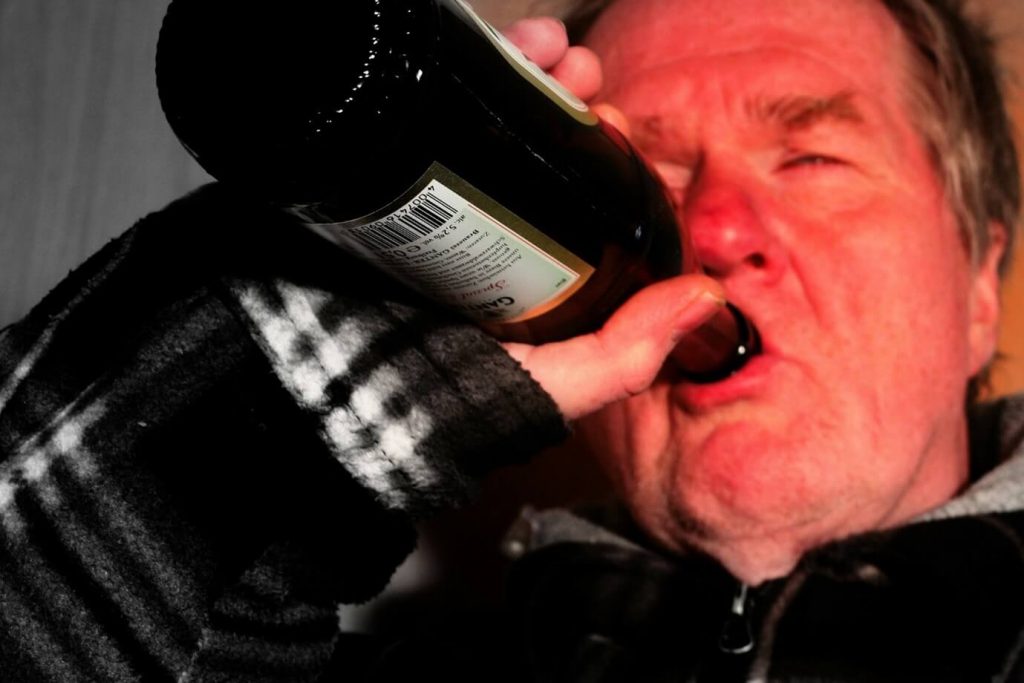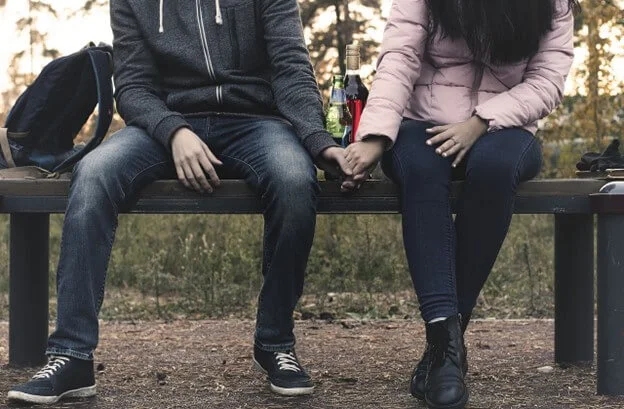Alcoholism or Alcohol use disorder is a medical condition characterized with the inability to control alcohol consumption regardless of its negative social, professional, or health effects.
If your partner drinks to the extent that you’re wondering, “Is my boyfriend an alcoholic?” there’s a high probability they have an alcohol use disorder. This means they have a problem with alcohol that’s likely to continue.
These problems might not be noticeable at first, but if you keep seeing your boyfriend display dysfunctional behaviors related to alcohol, it’s likely they’re struggling and you should, therefore, talk to them about it and also consult a doctor.
The alcohol dependence behaviors your boyfriend may manifest include:
- Drinking more than he usually does.
- He may become argumentative or violent when he has had too much to drink.
- Spending a lot of money on alcohol.
- Not being able to stop drinking even when they’re feeling sick or injured
- Displaying other signs of addiction.
If you’re concerned about a loved one’s alcohol use, it’s important to talk to with empathy, putting in mind that this is a sensitive topic for them.
Signs that your boyfriend is an alcoholic
Socializing around alcohol
If your partner prefers to keep the company of other drinkers and also spends a lot of time with them, it can be a sign that the person has an alcohol problem. They might not want to spend time with people who don’t drink, or they might only want to go to events where alcohol is present. Your boyfriend may be struggling with alcohol if after accompanying you to one social function or another, he routinely recommends going to a bar afterward.
Drinking to release stress
As a depressant, alcohol slows down your brain and makes you feel calm and relaxed. Your partner may be a victim of alcohol use disorder if he invariably resorts to alcohol to help him feel better.
High alcohol tolerance
If you notice that your partner doesn’t seem drunk until he has had a lot to drink, then he has developed alcohol tolerance. If the condition is not addressed, he would need to drink more and more to get to the same high.
Out-of-character behavior
When people drink, they often act differently than usual. For example, if your boyfriend is usually quiet, he might start swearing or being loud. Or, he may start displaying his emotions though he rarely does so. Such changes in behavior may be an indication that your boyfriend is developing alcohol dependency.
Temper tantrums
Another early sign that your boyfriend may be developing alcohol disorder is throwing temper tantrums and becoming impatient when its alcohol o’clock. Anger and violence, if not addressed, can affect his relationship with others.
Unable to control alcohol use
You may have noticed that your partner often drinks even though he doesn’t want to; he may say he’ll only have one or two drinks, but often winds up drinking more. It may be because he is with others who are doing the same, but it’s a sure sign that he is becoming dependent on alcohol.
Drinking any type of alcohol
Most people drink a few favored brands of alcohol. However, if your partner has alcohol addiction, he will drink any type of alcohol he can find. Not discriminating between brands is a clear indication that his drinking is a problem.
Causes of Alcohol Use Disorder
There are different kinds of risk factors that can increase your chances of developing an alcohol use disorder. Some of these factors are psychological, including stress and anxiety; environmental, like living in a poor or dangerous neighborhood; they could be biological, like a family history of alcoholism.
Though it’s not always easy to become addicted to alcohol, the following factors should be considered:
Family history
Research shows that alcoholism is a genetic disease.

Genes are an important factor in how likely one is to have alcohol problems, but so is their environment. Their parents’ drinking habits may also play a part in their own risk for alcohol problems.
Consider looking into your boyfriend’s family history immediately you notice a pattern.
Mental health issues
Mental health issues and a background of trauma are both very common and often go along with alcohol abuse. People with a history of childhood trauma are especially likely to develop alcohol abuse disorder. They often drink when they are trying to manage PTSD.
Social and peer groups
Some people are more likely to develop an alcohol abuse problem if they have friends, partners, coworkers, parents, or other family members who often drink. There’s an old street saying that goes “if five of your friends are alcoholics, you will be the sixth.”
Stress
Alcohol is a depressant, meaning it relaxes the central nervous system. Therefore, some people use alcohol to cope with stressful or challenging emotions, such as anger, frustration, loneliness, or anxiety.
Alcohol makes them feel less anxious and more relaxed but drinking often may lead to alcohol tolerance and further develop into full blown addiction.
Effects of Alcohol Use Disorder
Drinking can lead to a variety of effects. For example, a person could lose their job, go bankrupt, get in trouble with the law, have their driver’s license revoked, or even lose friends and family. Most people with alcohol abuse disorder (AUD) can’t stop drinking even if they want to.
Alcohol also makes it harder for people to focus on their everyday responsibilities. For example, neglecting to pay kid’s tuition fees but still be able to buy alcohol. This might put a couple in a constrained financial position and eventually destroy their relationship.
Most importantly, alcohol can damage organs in the body and make you more susceptible to illness and even death. Excessive alcohol consumption leads to chronic diseases such as:
- Stroke
- Liver disease
- Heart disease
- High blood pressure
- Early on-set of Dementia
- Weak immune system
- Cancer
Getting Help
If your boyfriend or loved ones are suffering from alcohol use disorder, you need to help them find appropriate treatment from the wide variety of options available.


